Georgian Medical Tourism
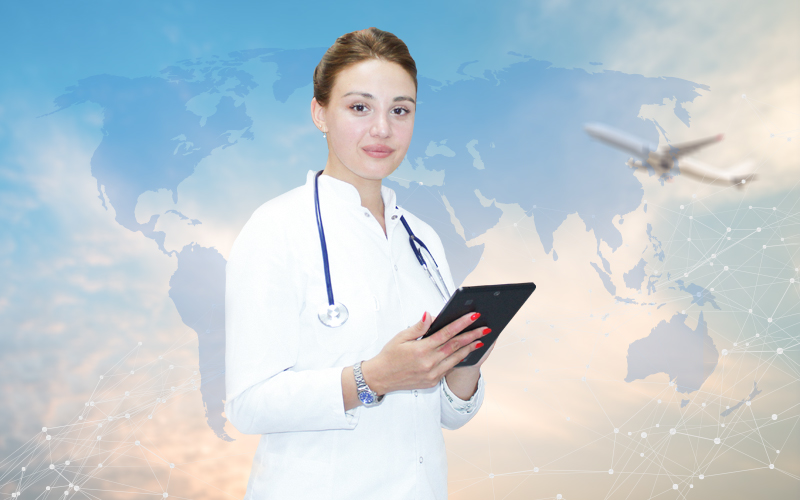
The National Center of Surgery was founded in 1946 on the foundation of Georgia's Scientific-Research Institute of Experimental and Clinical Surgery. It is a multifunctional medical center with a long history that welcomes and treats patients from all over the world. Foreign patients can receive the following medical services from the National Center of Surgery:
- Department of Radiotherapy;
- Digital PET/CT;
- The Stroke Center;
- Department of Surgery;
- Outpatient Department;
- Department of Neurosurgery;
- Department of Nephrology, Transplantation, and Hemodialysis;
- Endovascular, Vascular and Reconstructive Surgery;
- Blood bank;
- Department of Gynecology;
- Hemostasis Laboratory;
- Department of Blood Diseases;
- Department of Traumatology;
- Department of Critical Care Medicine;
- Anesthesiology;
- Multi-profile Department;
- Emergency Assistance;
- Center for Hemophilia and Thrombosis;
- Vascular, Plastic and Reconstructive Surgery.
Department of Radiotherapy
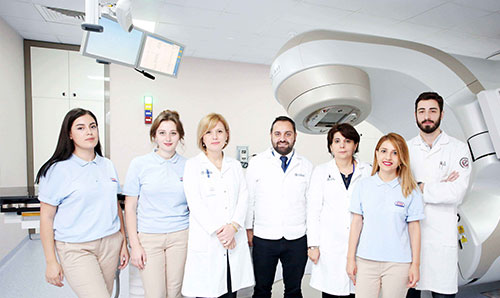
The following organs are treated using modern technology in the Radiation Department:
- Brain;
- Head and neck;
- Lung;
- Chest;
- Gastrointestinal tract;
- Urogenital system;
- Bones.
Truebeam and Vitalbeam, the most advanced and sophisticated beam accelerators from the well-known American Company Varian, are installed in the department. Varian radiation accelerators allow patients who would not otherwise be able to receive radiation therapy to have continuous treatment. Our department's personnel selects radiation treatment strategies individually, taking into account the most recent suggestions. Following CT imaging-based planning, the target and risk organs are contoured, as well as the radiation dose and the number of fractions. If necessary, the DIBH approach is used for scheduling (synchronized irradiation with respiration). A team of expert physicists is directed by cutting-edge planning approaches like 3D, iMRT, and VMAT (RapidArc). The group determines the treatment plan such that the target volume receives the highest dose prescribed by the physician while protecting vital organs and minimizing the risk of problems. The daily treatment method is carried out under the supervision of IGRT (image-guided radiotherapy treatment), which ensures that the treatment plan is carried out precisely. Each patient's planning is conducted with the utmost care and adherence to all safety precautions.
In addition, the patients at our center can receive HDR brachytherapy treatment. Brachytherapy is a high-tech method that involves injecting a radioactive chemical into the tumor location for an extended period. This strategy allows us to irradiate the target volume with a crushing dose while sparing as many healthy tissues as possible around the tumor.
More information can be found at the following link:
Digital PET/CT
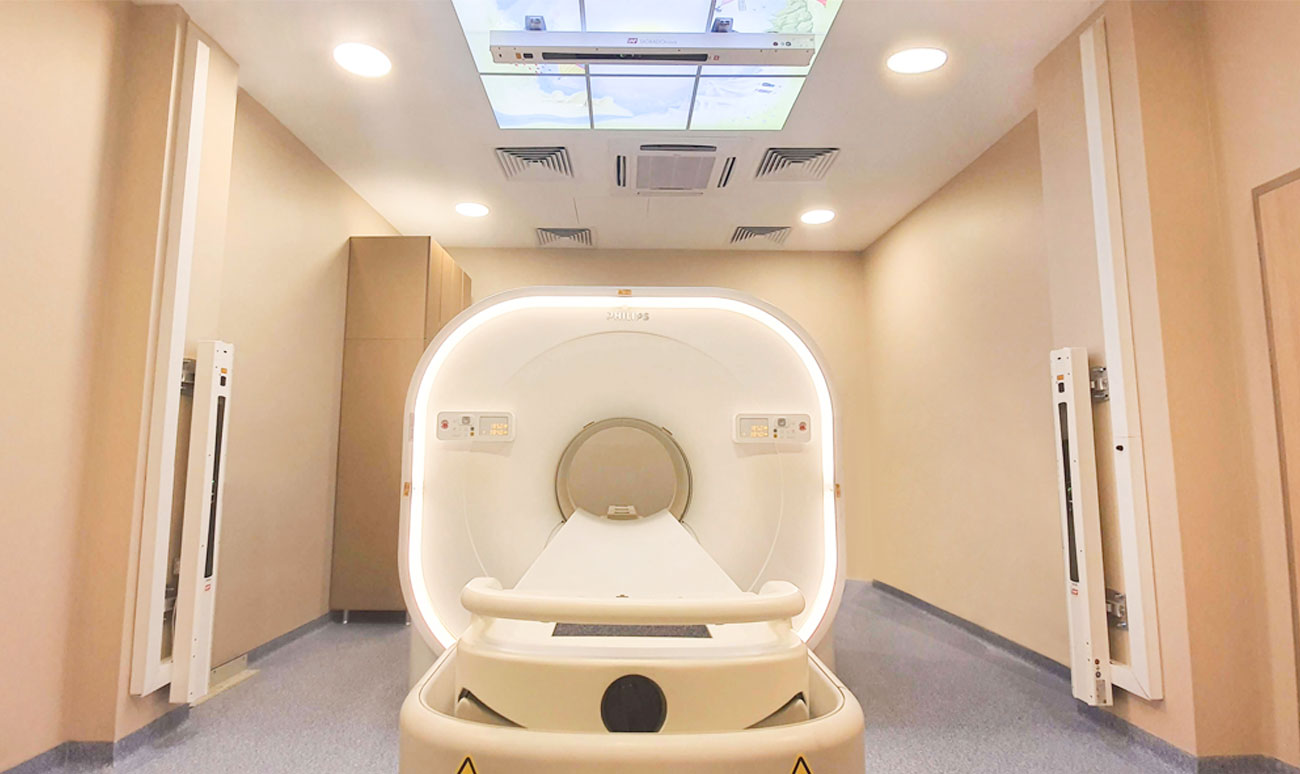
Digital PET/CT (Philips Vereos Digital PET/CT) system is the world's first and only fully digital positron-emission computed tomography system. The National Center of Surgery provides Georgian and international oncology patients with a once-in-a-lifetime opportunity to participate in high-quality, life-saving diagnostic research!
The same procedure can be used by otherwise healthy people who want to analyze their bodies for early identification of oncopathological and neurological disorders.
The benefits of Philips Vereos Digital PET/CT allow us to detect millimeter-sized tumors, allowing doctors to diagnose cancer at an early stage and appropriately guide treatment approaches. PET/CT scans alter treatment strategies in 36% of oncology cases!
For more information go to the link:
The Stroke Center
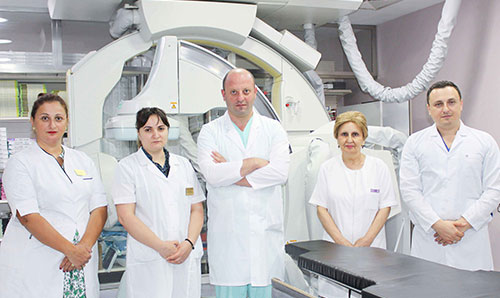
The patients from the Stroke Center are managed in the National Center of Surgery according to American (USA) and European (EU) standards! Several hundred people have survived death or severe handicap since its inception. This was accomplished with the assistance of competent people, contemporary technology, and medical equipment, including the most recent Japanese double-arm angiography and current OMRON equipment. Stroke is classified into two types: ischemic and hemorrhagic.
The ischemic form is caused by thrombosis, cerebrovascular embolism, spasm, and/or a significant decrease in blood flow induced by atherosclerotic plaque, which is followed by the cessation of blood supply to the relevant area of brain tissue.
The hemorrhagic form is characterized by a bleeding that occurs in the brain. It usually occurs when the blood pressure rises, causing one of the blood artery walls to be damaged and blood to be pumped into the brain material. This is followed by the manifestation of clinical indications specific to the affected area of the brain.
For more information go to the link :
The Department of Surgery
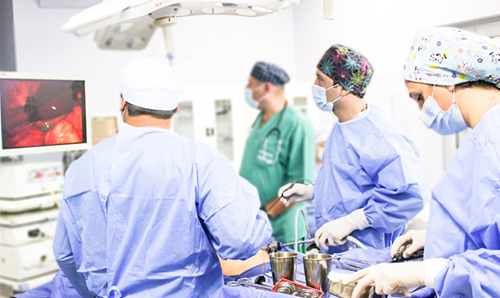
The Department of Surgery is outfitted with cutting-edge technology, cutting-edge equipment, and postoperative wards. Clinical expertise or professionalism enables surgeons to solve a wide range of surgical challenges. They provide unwavering care to the patients 24 hours a day, seven days a week. They can do open surgery as well as laparoscopic or endoscopic procedures. In addition to treating all nosologies in general surgery, such large-scale operations are conducted here:
- Slivgastrectomy;
- Hemihapatectomy (liver resection);
- Gastrectomy;
- Oncological and non-oncological surgeries;
- Pancreaticoduodenal resection;
- Hemicolectomy;
- Laparoscopic interventions;
- Reconstructive operations of the anterior abdominal wall (hernias, etc.)
- Endocrine Surgery (thyroid surgery)
For more information go to the link:
Outpatient Department
Every day, a great number of people use outpatient services. Noteworthy are the daily discounts for patients, as well as such cutting-edge equipment as:
- 32 Slice Computed Tomography - Toshiba Aquilion RXL;
- Echocardiography Device - TOSHIBA Aplio 400;
- Ultrasound Elastography Machine - Toshiba Aplio 500;
- Computed Tomography - Toshiba Aquilion Lightning SP;
- 128-slice Computed Tomography - Philips Vereos Digital CT;
- Magnetic Resonance Computed Tomography - TOSHIBA vantage Elan;
- Endoscopic Device - OLYMPUS EVIS EXERA III CV 190.
For more information go to the link:
The Department of Neurosurgery
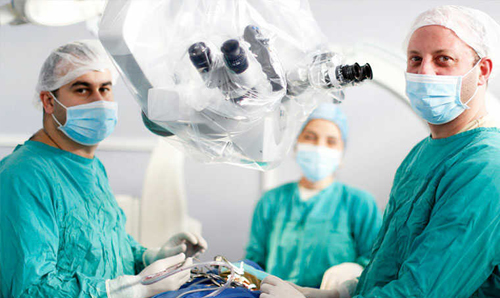
The Department of Neurosurgery is always on the cutting edge of modern medicine. In Georgia, we establish the environment for neurosurgery and pioneer cutting-edge surgical techniques. The National Center of Surgery's Department of Neurosurgery performs neurosurgical surgeries of varied difficulties and directions, such as:
- Operations during spinal and brain pathologies;
- Invasive interventions by the endovascular method in vascular pathologies of the brain;
- In the case of cerebral aneurysms, both endovascular and open approaches are used.
It is worth noting, that the National Center of Surgery continues to utilize the still-exclusive method of thrombectomy on a large scale across Georgia!
For more information go to the link:
The Department of Neurosurgery
The Department of Nephrology, Transplantation, and Hemodialysis
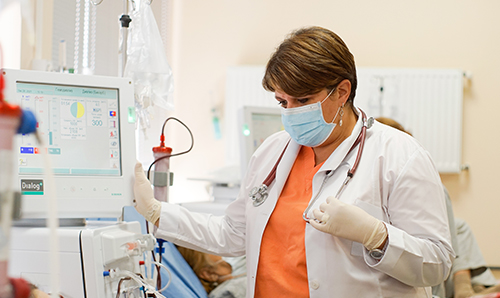
The Department of Nephrology, Transplantation, and Hemodialysis treats both international patients who are part of the state dialysis program and dialysis-dependent foreign patients who come in regularly. Every day, three shifts of hemodialysis are performed. Dialysis is the process of cleaning the blood with the use of a semiconductor membrane. Dialysis is used to artificially eliminate metabolic products and fluids from the body when the kidneys are unable to operate correctly. The treatment is used to treat both acute and chronic renal insufficiency. It lasts about 4 hours on average and is absolutely painless.
In the Department of Critical Care Medicine and Emergency Care, conditions for emergency hemodialysis are also available. This service is unique to Tbilisi and is offered 24 hours a day, seven days a week.
For more information go to the link:
The Department of Nephrology, Transplantation, and Hemodialysis
The Department of Vascular, Endovascular, Plastic, and Reconstructive Surgery
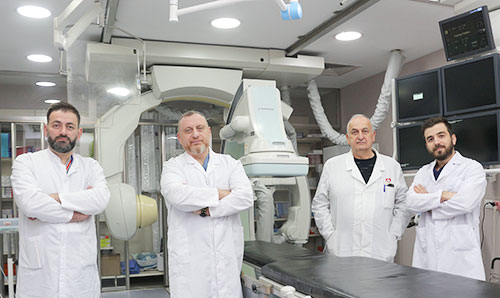
Since 1993, the National Center of Surgery has held the Department of Vascular, Endovascular, Plastic, and Reconstructive Surgery. Work is being done in the practical, educational, and scientific fields. The department performs the following types of surgeries: microsurgical reconstruction of blood vessels and nerves, autovenous and autoneurotic plastic surgery, stripping, phlebectomy, miniflebectomy, sclerotherapy, laser ablation, fascioplication, microsurgical autovenoplasty, valvuloplasty, endarterectomy, shunting, extraanatomical shunting, arterioplasty, trunk vascular prosthesis, microsurgical resection of fistulas, lymphangioplasty, scalenectomy, transthoracic sympathectomy, endovascular interventions, the content and methods of which have been greatly enhanced and diversified in the last 5 years with the purchase of angiography in the clinic. Modern two-arm angiography Trinias B12 enables aortic diseases to be addressed endovascularly (rather than openly) and surgery can be performed in the most cost-efficient and productive method for the patient. Simultaneously, the clinic always has a supply of stent grafts for the chest and abdominal aorta, allowing it to receive urgent patients 24 hours a day and save lives through fast, highly qualified surgeries!
For more information go to the link:
The Department of Endovascular, Vascular and Reconstructive Surgery
The Blood Bank
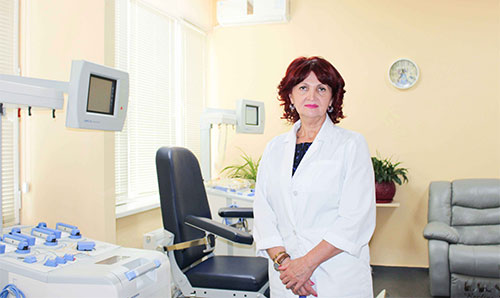
Blood bank functions include donor blood collection, processing, screening (hepatitis, B, C, AIV infection, syphilis), and clinical (total blood, group, Rhesus, phenotyping, and KeLL factor) research, and then providing the clinic with blood components. The bank is outfitted with „Fresenius" called „Amicus" high-tech and sophisticated blood separators. In the case of platelets, the clinic's blood bank and cutting-edge equipment allow us to send to the recipient the number of dosages that were previously manufactured from multiple donors and for which only 200 ml of plasma is adequate. The current processes of the National Center of Surgery's Blood Bank are robotic and sophisticated. The equipment is capable of producing functionally strong blood components such as thrombo concentrate and erythrocyte mass. Blood plasma and stem cells are also created.
For more information go to the link :
The Department of Gynecology
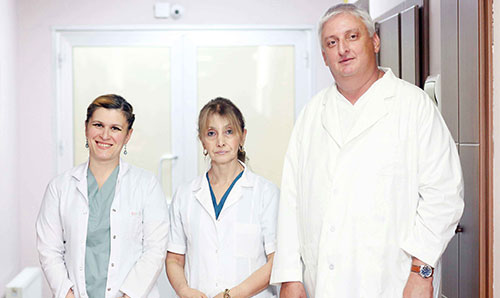
The Department of Gynecology conducts all types of medical-diagnostic research, therapeutic and surgical treatment for pathologies such as tumor pathologies of the uterus and its appendages, pre and postmenopausal periods, uterine bleeding of various genesis, endometriosis, uterine prolapse and ejaculation, pregnancy patronage, infertility diagnosis, and surgical treatment, and more. It should be emphasized that the majority of gynecological surgeries conducted in the clinic are laparoscopic, which is especially significant for women of reproductive potential. Laparoscopic surgery, on the other hand, provides a number of advantages. For starters, it is less traumatic, which means that recovery is quicker and easier, and the post-surgery phase is considerably shorter and lighter.
For more information go to the link :
Hemostasis Laboratory
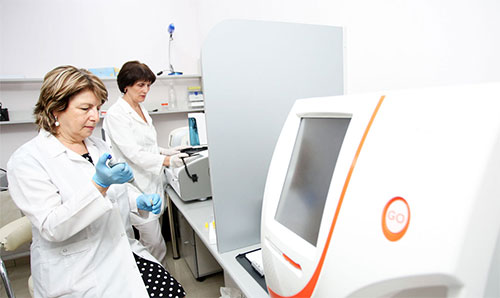
The World Hemophilia Federation sponsored and funded the establishment of the Hemostasis Laboratory. Laboratory professionals were taught to understand current research methodologies as part of the World Federation program At Minneapolis University Clinic, USA, the Mayo Clinic, and the Royal Hospital in London.
The laboratory obtained contemporary world-class equipment with the assistance of the World Hemophilia Federation. The laboratory has been approved by the Sheffield Quality Control Center in the United Kingdom since 2002. Coagulation plasma factors (YIII, IX, XI, XII, YII), Von Willebrand factor study, qualitative measurement of APTT and PT dependent inhibitor, and Bethesda method determination of inhibitor titer are all performed exclusively in this laboratory. Platelet function in response to several agonists (ristocetin, ADF, collagen, epinephrine) is also studied in the lab, allowing for the differential diagnosis of thrombocytopathy.
For more information go to the link:
The Department of Blood Diseases
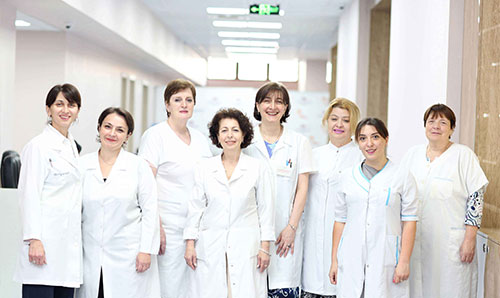
The Department of Blood Diseases treats acute and chronic leukemias, non-and Hodgkin's Hodgkin's lymphoma(HL), myeloma, anemias, thrombocytopenic purpura, and coagulopathies. It is regarded as the gold standard in chemotherapy, as well as medium and high-dose chemotherapy courses. Hematologists collaborate with colleagues from other countries. It becomes difficult to diagnose and casuistic cases and decide therapy strategies with them, as a result of the conciliation. Thrombosis, congenital and acquired bleeding disorders are diagnosed and treated at the Hemophilia and Thrombosis Center's base. The center has specialized hardware support (none of which can be found in the Caucasus) for studying the functioning rate of platelets, allowing for more precise treatment.
For more information go to the link:
The Department of Blood Diseases
The Department of Traumatology
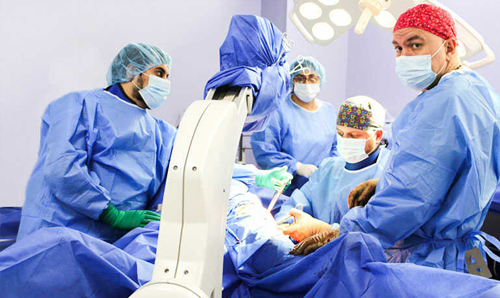
The Traumatology Department treats patients with severe injuries of every location and severity. The clinic is outfitted with cutting-edge technology, including an „EOP” electro-optical converter and a Shimadzu stationary X-ray machine. We employ German brand „Aesculapius” implants that are constantly available in the clinic, so the patient receives trauma services on an ongoing basis. The National Center of Surgery has successfully completed over 2,000 procedures of varying degrees of difficulty, including the majority of endoprostheses. Official statistics show that while the global risk of complication from this type of surgery is 2%, the risk in our clinic is close to 0%.
For more information go to the link:
The Department of Traumatology
The Department of Critical Care Medicine
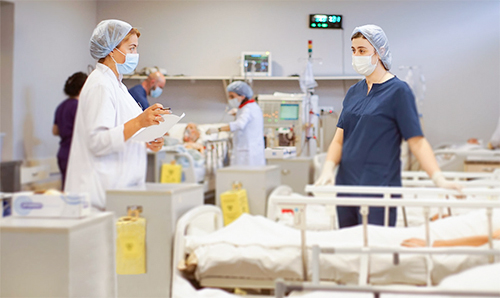
The Department of Critical Care Medicine contains 27 beds, including 16 in the Critical Care Section and 11 in the Intensive Care Unit. On average, 120 patients are treated in the critical care unit each month, the majority of whom are in critical or severe condition. Because there is such a wide range of surgeries, the profile and severity of postoperative patients varies. Because of the number of clinics, the department handles patients with critical or non-surgical support of any profile in critical and emergency conditions, as well as patients in the postoperative phase, depending on severity. The Critical Care Department is outfitted with cutting-edge technology to monitor, maintain, and replace patients' crucial functions. The department is supplied with cutting-edge respirators, invasive and non-invasive monitors, a dialysis machine, and so on.
For more information go to the link:
The Department of Critical Care Medicine
Anesthesiology
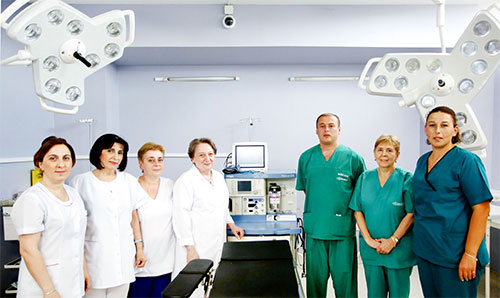
The Department of Anesthesiology is still expanding and developing. Medical equipment that has been updated (anesthesia machines, invasive cardiomonitors, blood gas analyzer, infusomat, capnographs). Staff training is ongoing, and employees actively participate in conferences and learn from the experiences of their international counterparts.
In anesthesiology all types of anesthesia are performed with modern methodologies and recommendations, taking into account the patient's overall state as well as the specifics of the operation. A universal hybrid operating unit has also been included, which allows any operation to be conducted in continuous mode. The operating room is outfitted with cutting-edge anesthetic technology.
For more information go to the link:
The Multiprofile Department
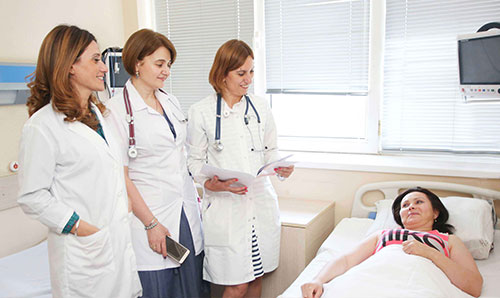
The Multiprofile Department includes Toxicology, Therapy, Cardiology, Allergology, and Endocrinology. It should be noted that the toxicological direction of the National Surgery Center is one of the two departments in Georgia. The direction's top objective is the staff's high level of expertise and their ongoing theoretical or practical understanding of their experience. The therapeutic profile is one of the department's key directions, where patients are treated in therapeutic, allergological, and endocrinological directions. Intensive care wards equipped with high-tech medical equipment and collaborative, teamwork of highly qualified medical professionals give a full examination, diagnosis of any patient of any complexity within 24 hours under constant care and perfect care circumstances.
For more information go to the link:
Hemophilia and Thrombosis Center
The center is open 24 hours a day and provides outpatient and inpatient services to children and adults with hemophilia. Orthopedic services are also beneficial to hemophilia patients. The Georgian Hemophilia and Donor Association, as well as prominent hemophilia centers worldwide, collaborate with the Hemophilia and Thrombosis Center. The center's staff participates actively in international training and conferences. Around 400 patients are registered in the National Center of Surgery's Hemophilia and Thrombosis Center.
For more information go to the link:
Hemophilia and ThrombosisCenter
Emergency Assistance
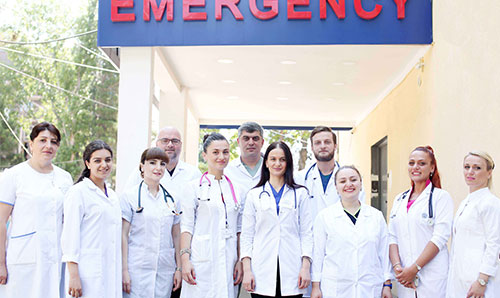
The Emergency Department is fully equipped with resuscitation equipment. It has all the necessary medical equipment for emergency care and intensive care, 24/7 ultra-modern radiograph, ultrasound and echocardiograph APLIO 400 and APLIO 500, TOSHIBA computed tomography, magnetic resonance imaging, or Trinias B12. The department is distributed across 8 beds, and the latest functional and maneuverable beds from the German business „Schröder” are employed for this purpose. All beds feature oxygen stations and a monitoring system, allowing each patient’s cardiological monitoring. Within 24 hours of emergency intervention, the coronary arteries, brain, and other arteries can be evaluated and stented. On-site, skilled and expert specialists service this equipment. In addition, a state-of-the-art laboratory is functional, with easy access to all laboratory tests.
For more information go to the link:




